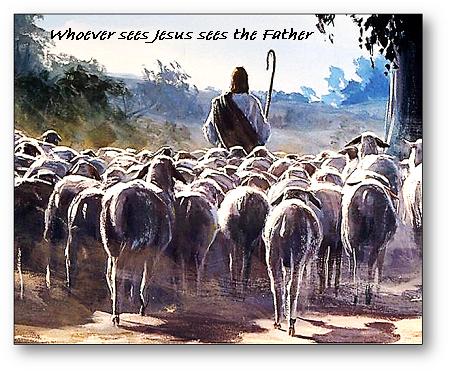The Biblical Background of the Doctrine of the Trinity
The Biblical Background of the Doctrine of the Trinity

Many Christians do not concern themselves much with the Trinity. Orthodox Christians believe in it with a holy conviction, yet they often find it difficult to explain exactly what it entails. Nevertheless, they are deeply convinced that not only their heavenly Father is God, but Jesus Christ and the Holy Spirit are too. Yet at the same time it is true that are not three gods, but only One. Therefore, in the Christian tradition, God is designated by that unique word in which both the number ‘three’ and ‘one’ are present: Triune.
While this belief in the triune God comes to the fore regularly in the songs that are sung in the church liturgy as well as in the prayers, it more often than not plays no role of importance in daily life. Ministers and teachers also find it difficult to explain the gist of it in a clear and understandable manner. In congregations where it is the tradition to preach regularly from the Heidelberg Catechism, Lord’s Day 8 from the Catechism (the Lord’s Day dedicated to the Trinity) often causes the preacher some anxiety.
Remarkably enough, outsiders are often more intrigued by the doctrine of the Trinity than Christians. This is certainly true of Jews and Muslims, who tend to consider this doctrine to be a serious blasphemy, because it is, in their view, a subtle form of polytheism. This is also true of western agnostics and atheists. They can often imagine belief in a God, but opt out when this God is said to consist, in some mysterious way, of three different identities. They compare it to someone imagining himself to be three persons simultaneously. The association (naturally very offensive to Christians) with a multi-personality disorder is quick to be made, and the doctrine of the Trinity then provides a good reason to steer clear of Christianity from then on. Seekers who are still open-minded about Christianity also often come up against this ‘problem’. Some years ago, field research showed that the question of God’s Trinity is one of the top three questions asked during the Alpha course (the other two are how there can be so much suffering and evil in the world; and why, amongst all religions, only the Christian faith should be true). Apparently, the complicated doctrine of the Trinity is one of those themes that cause people to doubt whether they should become a Christian.
This last conclusion seems a great pity to me, and totally unnecessary. In this article I would like to attempt to explain what the doctrine of the Trinity is, and why it is so important. I will not elaborate much on where this doctrine came from, on the many complicated discussions that were dedicated to it in the first centuries of church history, or on its later vicissitudes. There is enough other literature at hand on that subject (whoever wishes to know more about this can refer to the books of Butin and Olson & Hall mentioned in the bibliography at the end of this article). Instead, I would prefer to make an attempt at illustrating that the doctrine of the Trinity comes directly from the Bible, and bring to attention its practical relevance.
The Doctrine and the Bible⤒🔗
What most Christians do find a very important part of their faith is the Bible. One does not have to believe that the Bible was dictated word for word by the Spirit and written down infallibly by the biblical scribes, in order to appreciate the importance of the meaning of the Bible to the Christian Faith. Most Christians even read the Bible on a daily basis. Well then, when we try to do justice to the whole of the Bible in an unprejudiced manner, something like the doctrine of Trinity is bound to emerge from it. Not completely worked out, and not in a quick-fix manner – which is why the church needed some centuries to express the doctrine of the Trinity adequately – but so much so that the seeds of this doctrine can be found in the Bible.

Whoever tries to dispense with the doctrine of the Trinity will, by definition, need an alternative, and indeed many have been offered. For example, there is the idea that God is one and singular – a deeply rooted conviction in Greek philosophy. Or the notion that there are in fact two gods – a position widely held in Persian religions, which gained ground in the early days of Christianity through the teachings of Marcion: there is a good God (the Father of Jesus) but also a bad one (the Creator of all matter). Both options were rejected by the Church at an early stage because they obviously do no justice to the testimony of the apostles. However, some more subtle alternatives remained active for a longer period in church history and still emerge from time to time. Here too there are two positions: the idea that God is one person playing different roles (technical term: modalism or Sabellianism); and the thought that God the Father is just a little bit more Divine than the Son and the Holy Spirit (technical term: subordinationism). On closer inspection, we would have to say, however, that these alternatives also distort the biblical message. Even in the Old Testament, we cannot place what is said of God under one single denominator.
Old Testament←⤒🔗
Starting with this last observation, let us begin by looking at the Old Testament. I would like to take the well-known history of the ‘binding’ of Isaac in Genesis 22 as an example. At first, it is God himself who addresses Abraham and calls upon him to sacrifice his son (vv. 1, 2). Subsequently, when Abraham is at the point of killing his son on mount Moriah, it is the angel of the Lord who addresses him by name just as God did, to inform him that he need not slay his son (vv. 11, 12). After that, when Abraham has sacrificed a ram instead of his son, and named the spot ‘God will provide’, the angel of the Lord calls him a second time. That goes as follows:
I swear by myself, declares the LORD, that because you have done this and have not withheld your son, your only son, I will surely bless you.Genesis 22:16, 17
Apparently, the angel of the Lord is brought forward as someone different from God in the one case and identical to God in the other. It is striking that the angel here is not a sort of go-between, but, just like God, speaks ‘from heaven’. The content of the message appears to differ at first: God asks Abraham to slay his son, whereas the angel forbids it. Is God for the bad news and the angel for the good? No, the story reaches a climax when in vv. 16 and 17 God and the angel are at one. God identifies himself completely with his angel, and Abraham need not be afraid that God will ask something different after all.
We also come across similar patterns of distinction-and-identification with God in other Old Testament archetype stories, like when God calls Hagar back from the desert (Gen 16), Jacob’s discussion with Leah and Rachel about what took place at Bethel (Gen 31), the calling of Moses (Ex 3) and the birth of Samson (Judges 13). Especially intriguing is Ex 23:
See, I am sending an angel ahead of you to guard you along the way and to bring you to the place I have prepared. Pay attention to him and listen to what he says. Do not rebel against him; he will not forgive your rebellion, since my Name is in him. If you listen carefully to what he says and do all that I say, I will be an enemy to your enemies and will oppose those who oppose you. My angel will go ahead of you and bring you into the land of the Amorites, Hittites, Perizzites, Canaanites, Hivites and Jebusites, and I will wipe them out.Exodus 23:20-23
Here again we see the mysterious change taking place, in which God first distinguishes himself from the angel, and subsequently identifies himself with him completely: ‘If you listen carefully to what he says and do all that I say...’ But here we also see what this identification is based on: ‘since my Name is in him’. That is an exceptionally interesting formulation, especially when positioned alongside the manner in which God, according to the New Testament, gave his Name to Jesus (Phil. 2:9, 11), and how Jesus, according to the Gospel of John, applies the Name of God (‘I am who I am’, Ex. 3:14) to himself in the so-called ‘I am’ sayings (‘I am the Good Shepherd’, etc.).

Similar observations can be made in the Old Testament regarding the Spirit of God (ruach VHWH). We cannot go into this in detail at this point, but very often God’s actions are attributed to the Spirit – and in these cases also, it is noteworthy that, on the one hand, God’s Spirit has his own identity (that is to say: his own ‘colour’ and ‘character’) with respect to God, but, on the other hand, also merges with God himself. In short, careful reading of the Old Testament passages already take us a long way along the road to understanding what caused the early church to gain the insight that formed the grounds for the doctrine of the Trinity.
New Testament←⤒🔗
In the New Testament this original pattern materializes even further. The gospels show us how Jesus calls upon God as his Father, and in his sermons calls upon the people to turn to God. Mark summarizes Jesus’ mission as: proclaiming the good news of God (Mark 1:14). That good news has everything to do with the coming Kingdom of God (Mark 1:15). Many of the parables mean to clarify the way things work in God’s Kingdom. They make it clear that God’s Kingdom is not of this world, for it is not about power and high positions, but about compassion regarding those who are lost. The parables show us that grace, love and forgiveness set the tone – while at the same time judgment is passed on those who want no part of this. Jesus’ whole presentation was thoroughly theocentric. His goal was to bring into the spotlight the all-encompassing relevance of God and of a life under God’s rule. Even when someone suddenly called out: ‘Yes, but you yourself are not just anybody – you are the Messiah, the Son of God’ – Jesus kindly asked the caller not to continue along this line (Mark 3:11, 12; 8:30). He sometimes forbade his followers to speak of his miracles (Mark 1:44, 5:43, 7:36, 8:26). And if someone addressed him as ‘Good master’ it was as if Jesus, startled, directly wished to set things straight: ‘Why do you call me good?’ Jesus answered. ‘No one is good – except God alone’ (Mark 10:18). He also says (John 8:50) ‘I am not seeking glory for myself ... but I honour my Father’ (John 8: 49). In short, all that Jesus did and said was done with the purpose that we give to God the position he deserves: by acknowledging his majesty, placing his will above all, and allowing him to set the course. That is the message that Jesus preached throughout the country for three years. His whole life was filled with this. You could say, in agreement with the 20th century Dutch theologian A.A. van Ruler, that the New Testament revolves around Jesus, but regards God and his Kingdom.
Spotlight←⤒🔗
How then does God react to Jesus’ performance? In the gospel, this becomes clearer along the way: by doing the exact opposite, namely, by placing Jesus in the spotlight, declaring him as his beloved Son. In the gospel we see God himself speaking on only two occasions, but in both cases it is to identify with Jesus and place him in the centre. Firstly at the baptism in the river Jordan (Matt. 3:17, Mark. 1:11, Luke 3:22), and later on at the transfiguration on the Mount (Matt. 17:5, Mark 9:7, Luke 9:35; compare also the summarized message in John 12:28).
After that, Jesus enters Gethsemane, the decisive moment in which he lets deeds meet words by assimilating himself with the will of his Father. He did that all the way to the cross. Subsequently, God spoke to him one more time by raising him from the dead. The resurrection, as New Testament scholars unanimously tell us today, was a Divine deed of rehabilitation. For here God made it clear in an unsurpassable manner: this man got it right in his message about Me! So whoever wishes to know Me must look to Jesus: to his message, his deeds and his death and resurrection. From now on it can be truly said: ‘Anyone who has seen me has seen the Father’ (John 14:9). In the fourth gospel especially, the gospel of John, we find the deepest and lengthiest reflections on this relationship, and see the entrance to the Kingdom of God and eternal life, joined to belief in Jesus (John 3:16).

That is why from Easter onward, in the words of the German theologian Rudolf Bultmann, Jesus the preacher became the preached. For from the resurrection onwards the Father glorifies the Son with a glory that is unsurpassed (see John 17:5). He gives him the name that is above every name (Phil 2:9) and gives him all authority in heaven and on earth (Math 28:18). He takes him up into the heavenly realms (Luke 24:51, Eph. 1:20, 4:10). And there even places all things under his feet (1 Cor. 15:27; Eph. 1:22). From Easter on, the Father places the Son in the spotlight. Just as the Son was always pointing towards the Father, so the Father now ensures that everything points to him. Everything in the New Testament now revolves around him. Moreover, we need no longer be silent about the fact that he is the Messiah.
On the contrary:
Therefore let all Israel be assured of this, says Peter, God has made this Jesus ... both Lord (Kurios) and Messiah.Acts 2:36
From now on the proclamation of the good news about God especially regards the decisive position assumed by Jesus. A matter of the greatest importance now is that no one knows the Father except those to whom the Son chooses to reveal him (Matt. 11:27).
Through the Holy Spirit←⤒🔗
But how can the Son reveal if he is no longer here? Has he not risen and ascended to heaven? The New Testament leaves no uncertainty as to that question: Jesus reveals through the Holy Spirit of God. That Spirit had already inspired and equipped him for his mission (Matt. 1:18-20, Luke 1:35; Matt. 3:16, Mark 1: 10, Luke 3: 22, John 1:32f., Luke 4:14, 18f., Matt. 12:28, John 3:34). Well, it is that same Spirit who is sent by the Father and the Son to ensure that the Son, and via the Son the Father, is placed in the centre all over the world. Towards this goal Jesus baptizes with the Spirit (Matt. 3:11) and his followers will receive the Spirit (Luke 11:3, John 7:39). The Spirit will ‘give them life’ (John 6:63) and teach them how to testify of Jesus even in difficult circumstances (Luke 12:12); he will even speak through them (Matt. 10:20, Mark 13:11). In short, the Spirit is the one who continues Jesus’ mission on earth: He makes people willing to ensure that the proclamation of the Kingdom is continued. He connects people to God’s forgiving love by getting them connected to Jesus (John 16:14a). Those who receive the Spirit then glorify both the Father and the Son. The surprising thing is that this has not developed gradually but was this way from the beginning. We have no indication whatsoever that there was ever a time in early church history when Jesus was not worshipped and glorified. That is sometimes assumed by the so-called ‘aggrandizement theory’, which claims that people started attaching more and more metaphysical powers to Jesus along the way, until, after a few centuries, he was placed on the same level as God. Even though this theory was trotted out again at the end of the last century by the Dutch theologian H.M. Kuitert, it is now generally viewed as simply at odds with all that we know about the first period of Christianity. From the very start it was true: ‘no one can say, “Jesus is Lord”, except by the Holy Spirit’ (see 1 Cor. 12:3b). It is the Spirit that teaches believers to call Jesus ‘Lord’, that is, to give him the title that in the Old Testament was only God’s due. It was seen in this way already in the first Christian congregations, and not just four hundred or so years later. The Spirit confirmed the complete unity between the Father and the Son, which is why the New Testament can, in one instance, speak of the Spirit of the Father (e.g. in Matt 10:20), and in another of the Spirit of the Son (e.g. Galatians 4:6). For is he not the Spirit of both?
Recapitulating the above: in the New Testament Jesus proclaims the kingdom of the Father. He is so intensely connected with this that he himself is the one who brings this kingdom to earth, making it a reality in his life, suffering and death. God the Father is the one who, in response to this, subsequently completely identifies with Jesus and defines himself as his God and Father. The Spirit, lastly, is the one who continues Jesus’ work on earth and completes it, just as he had also supported Jesus in his work. He inspires people to believe in and worship both the Father and the Son.
Let us stand still for a moment on this roundtrip through the gospel. How far are we now? What have we discovered? Have we ‘proved’ with the above that the doctrine of the Trinity is biblical? Have I, by means of a cleverly constructed collage of biblical texts, brought the reader so far that he must admit: ‘Now I can (unfortunately) no longer deny the truth of the doctrine of the Trinity?’ No, we cannot call it foolproof evidence. It is important to remain honest, not try to smuggle things in secretly that the New Testament does not exhibit. What the New Testament does portray however is this pattern of mutual involvement with each other of Father, Son and Spirit in the drama of redemptive history. In mutual respect of each other and in persevering love, all three of them are involved in bringing back the human world to God.

What the New Testament also shows us is that in accordance with this mutual involvement of the Father, the Son and the Spirit, it becomes common to name these three, or two of the three, in one breath. We see that Jesus and the Father are named in one breath in all the letters of Paul (Rom 1:7, 1 Cor 1:3, 2 Cor. 1:2, Phil. 1:2, Gal. 1:3, 2 Thess 1:1-2, 1 Tim. 1:1-2). In other places, the Spirit is also included (Matt. 28:19, the Baptismal formula; 2 Cor. 13:13, the New Testament blessing; Gal. 4:6; Eph. 5:18-20; 1 Pet. 1:1-2 and Jude 20-21). With this it cannot yet be said that Father, Son and Spirit share in the same Divine Nature (that they three are all ‘God’). But it can be said that in this way they all together form the object of Christian worship. That is remarkable enough, for we may only worship God.
Moreover it is important here to keep sight of the order of developments. Whoever wishes to point out the roots of the doctrine of Trinity in the New Testament does well not to refer simply to a few scattered Bible texts. In doing so you can make dreadful mistakes. Such as, for example, if you were to assume that the few words from 1 John 5:7-8 (...for there are three that bear record in heaven, the Father, the Word, and the Holy Ghost: and these three are one, – King James Version) are authentic, since here we are dealing with an interpolation from the Middle Ages, which was meant to prove the church right. To be able to understand where the doctrine of the Trinity comes from one must focus on something quite different from some scattered Bible texts, namely on the overarching pattern of God’s redeeming work in both the Old and the New Testament. The New Testament is entirely about the cooperation between the Father, Son and Spirit in the plan to let people with a death warrant share in God’s kingdom, and, in doing so, receive eternal life. That is the core of the events to which the gospels and letters wish to draw our attention. That is the reason why we have, in the above, stopped to look at these patterns, in the hope that the readers may become sensitive to them. From these patterns we can subsequently understand why so many separate texts speak in one breath of the Father, the Son and/or the Spirit.
The Final Step←⤒🔗
Still, one might say that according to the NT, of the aforementioned three persons who play a role in the drama of redemptive history, only the Father is truly God. Jesus and the Spirit are then instruments playing a role in God’s actions. They purportedly stand for two different aspects of the manner in which God comes to us: Jesus is the preeminent prophet who proclaims God’s message, and the Spirit is another word for God’s activity in people. In the economy of redemption (or more popularly phrased: in God’s plan of salvation) God then relates to earth through the human Jesus and through this Spirit. And in the realization of that plan, these three are single-minded. But, so some believe, God himself is naturally much more than that plan. In his essence he is concealed behind Jesus and the Spirit, and he could even turn out to be very different. Whoever stands eye to eye with Jesus is not necessarily meeting God himself. Jesus is the (or in any case a) way to God, just as the Spirit is. As soon as you have found God through this way you have achieved your goal and have left the road behind you. Jesus and the Spirit are like the scaffolding that is dismantled after the house is built. Thus God himself is not seen to be triune, but simply singular.
It is this portrayal of the matter that the Church had passionately rejected with her doctrine of the Trinity. For this approach gives the redemptive history as described in the Bible a secondary, subordinate position. In this portrayal, the gospel of the crucified Lord and the life-giving Spirit is no longer the decisive event that enables us to look right into the heart of God. It is but a step to what may be a very different eternal God hidden behind his threefold earthly appearance.
Usually the view is that God is the highest being, the unmoved mover, the One, the Absolute, or however philosophers call it. A divine being so exalted that he can only be approached along mystical ways, impossible to be squared with the image of the suffering Christ and the groaning Spirit. But if that is true, in the end we still have no idea what to expect from God. Then the whole Christian Faith is built on shaky ground.

In this way we do no justice to the Bible and do not take the message of salvation seriously. For in the Bible God makes himself known not just via Jesus Christ and the Spirit, but also as the God who is completely one with them. There is no God-behind-God. The God who gave his Son and his Spirit is the only one we know. As God made himself known in Jesus and the Spirit, so is he in reality – forever and in all eternity. But if that be the case, then we must also dare to take the final decisive step. For then it cannot be any other way than that Jesus and the Spirit share in God’s being. In God’s inclination towards us humans, of which the gospel speaks, God shows himself as the God who is always one with the Son and the Spirit and can never be thought of without them. Only in this way do we take seriously that ‘whoever sees Jesus sees the Father’ (John 14:9). And that it is the Spirit who fathoms God’s depths and allows us to share in this knowledge (1 Cor 2:10-14). For the knowledge of God mediated by the Spirit is not a sort of mystical ecstasy, or a vague ethereal feeling, but a knowledge that bears the stamp of the suffering and crucified Jesus (1 Cor 2:2, 8).
It is for this reason that the early church did not stop at a so-called ‘economical doctrine of trinity’, according to which Father, Son and Spirit are but temporarily ‘single-minded’ in their cooperation with each other. The church realized that she can only do justice to the biblical message by taking the final step too: if this is the way in which God reveals Himself to us, then it is also the way in which God truly exists – forever and in all eternity. For we would not be taking seriously God’s revelation in Christ and the Spirit, if we suspected a very different God behind them. That would become a great Unknown, the ‘hidden God’ that Luther feared so badly that he was sometimes frightened that the biblical God was all a pretence. The gospel however wants to impress upon us that God will never be other than how he made Himself known in the history of salvation. Yes, that he never was any different: always one with Christ and the Spirit. The doctrine of the Trinity is, seen in this light, the security seal on the heart of the biblical message. God is light; in him there is no darkness at all (1 John 1:5). That can only be true if God is not ambiguous but transparent; if his being is completely in accordance with his threefold revelation, meaning that God’s being is itself also threefold. Then Jesus and the Spirit belong essentially and from all eternity with God. They share in God’s one being, because God’s Name is in them (Ex 23:22).
It is clear then that from a biblical point of view it is really no blasphemy to believe in a triune God. The fact that no man will ever be able to fathom completely the manner in which God’s unity exactly relates to his tri-unity – our human reason is just too limited – does not make it nonsense. It is, as we saw, the only way to do true justice to what the New Testament tells us. It only goes awry when we start speculating separately from the New Testament about how God works. Unfortunately, that has taken place too often in history. The correct reaction to that is not to reject the doctrine of the Trinity, but to unearth it from the Bible itself. Then it becomes apparent that we cannot do with anything less. Therefore, whoever wishes, for the sake of Muslims or others, to place the doctrine of the Trinity in parentheses, loses all that makes the Christian faith distinctively Christian. For you don’t have to be a Christian to see Jesus as a ‘special inspiring person’, a prophet or a teacher of wisdom, and to see the Spirit as a ‘force’. The unique insight of the earliest Christians was the fact that in Jesus we are dealing with no less than God himself. And with that, as we saw, the doctrine of the Trinity was already given to us in the kernel.
Practical Meaning←⤒🔗
What now is the practical relevance of all this? We can make this visible by summing up the spiritual positions around which the doctrine of the Trinity has made demarcations, due to the fact that they were less-than-Christian (sub-Christian). There are six in all. All six positions survive up to the present day, actually occurring in real life, sometimes even en masse. But all six of them do injustice to the close connection between Father, Son and Spirit. The doctrine of the Trinity is therefore meant to stand guard around this unique message of the gospel, in which God is known only through Christ and the Spirit.
That means therefore:←↰⤒🔗
-
No Son without the Father. Christians should not allow themselves to be satisfied by seeing Jesus as a historical figure who taught us all sorts of important values and gave a good moral example. Whoever desires to do the New Testament justice, cannot possibly see only a prophet and wise teacher in him. For his purpose was to bring us into contact with the One who, in his view, was always and everywhere the most important Person, namely his God and Father. That is why it is simply not possible to follow Jesus without a focus on God. Whoever thinks differently about Jesus is not talking about the Jesus of the New Testament, the beloved Son of God.
-
No Father without the Son. According to the Christian Faith, you cannot associate with God in such a manner that the person and the work of Jesus are of no relevance. The cross and resurrection are not a stadium that one can leave behind in a moment of spiritual enlightenment or mystical ecstasy (as some Corinthians and other gnostic-influenced Christians thought). Jesus is the way to God, but not in the manner of a traveller who forgets the road he walked as soon as he has arrives at his destination. On the contrary, ‘Christians never approach so close to the Father that they can forget about the life, death and resurrection of Jesus; they can never find a place in the heart of the Father where there is no presence of the crucified and risen one’ (Mike Higton, Christian Doctrine, 86). Whoever thinks otherwise about that is speaking of a divinity different from the God that is proclaimed to us in the New Testament.
-
No Son without the Spirit. In the Christian consciousness it is simply not possible to have a relationship with Christ that is not being paved and mediated by the Spirit. Without the Spirit, Jesus remains to us either locked up in the past, as – to be sure – an important but somewhat mysterious historical figure, or at an unreachable distance in heaven. It is only the Spirit who can bridge the chasm between past and present, by showing us how all-decisive Jesus is to us. It is also the Spirit who brings Jesus from heaven into the human heart, by convincing that human heart internally that there is no one in heaven and on earth that loves it more than this very Jesus (Belgic Confession art. 26).
-
No Spirit without the Son. True, a Christian is filled with the Spirit – but the Spirit does not ever make us descend or prophesy so deeply or does not bring us onto such high planes that we should forget the cross on which Jesus died for our sins. For the Spirit brings joy and comfort, out of the cross and resurrection of Christ. He does not instigate a feel good faith in which everything revolves around self-confirmation and positive thinking. Every form of Christianity in which I find God in myself or myself in God, without Jesus being part of it, is therefore sub-Christian: it may make me a ‘spiritual’ person, but not a Christian. Whoever thinks he can pass Jesus by in a spiritual manner is speaking of a different spirit from that of the Father and the Son.
-
No Father without the Spirit. Christian faith in God is never ‘unspirited’. Christianity is not about a distant, far-off God who once upon a time fitted the world together like an intelligent watchmaker, but who now no longer concerns himself with it anymore. Man can believe in such a deistic God in a purely rational manner. But, Christianly speaking, that is not enough. Belief touches our heart and renews our life. It means that we have, through the Spirit, been included in a close relationship with the Father. The Bible uses big words to describe this, like ‘born again’ or ‘being made alive’ through the Spirit. Being in God is therefore a passionate experience: it is literally ‘enthusiastic’ (that word comes from en = in, and theos = God). We can only know this communion with the Father if we have been led into it by the Spirit – otherwise we are speaking of another Father than the one who according to the New Testament sent his Spirit.
- No Spirit without the Father. Conclusively, the Spirit never takes us beyond God the Father’s concrete plans and intentions for this hard reality on earth. Via Christ, he brings us back to the longing of the Father. He does not let us walk past God’s Kingdom and his justice. No, the Spirit lets us groan together with creation for as long as that creation has not been completed (Rom 8). For was it not the same Spirit who inspired Jesus to his proclamation of the Kingdom? The Spirit does not want Christians to draw back into an atmosphere of religious self-fulfilment, but equips them for a life of testimony and service.

In this way, the doctrine of the Trinity clearly marks out the coordinates within which the Christian Faith can flourish. The doctrine of the Trinity – together with the doctrine of who Jesus is – is not for nothing the original primeval dogma of the Christian community: the pre-eminent guide through which one can test the spirits, to discern whether they are of God.

Add new comment